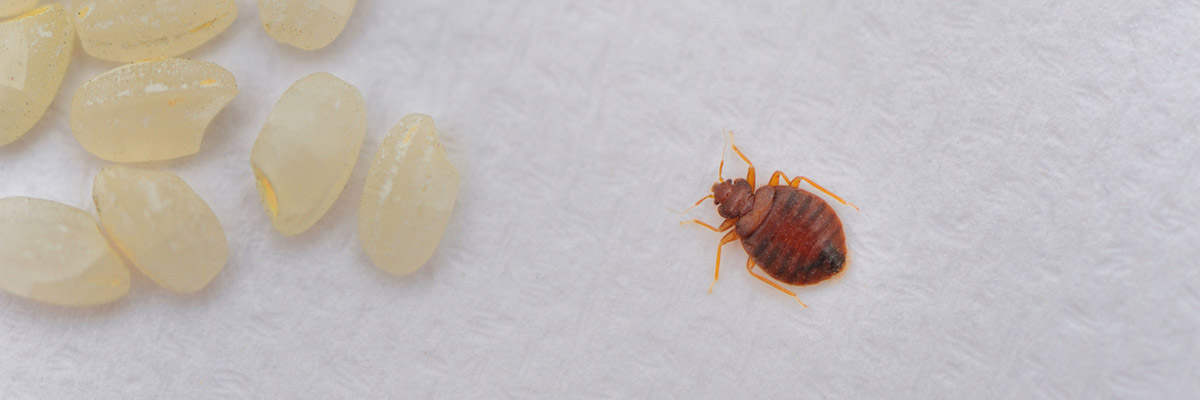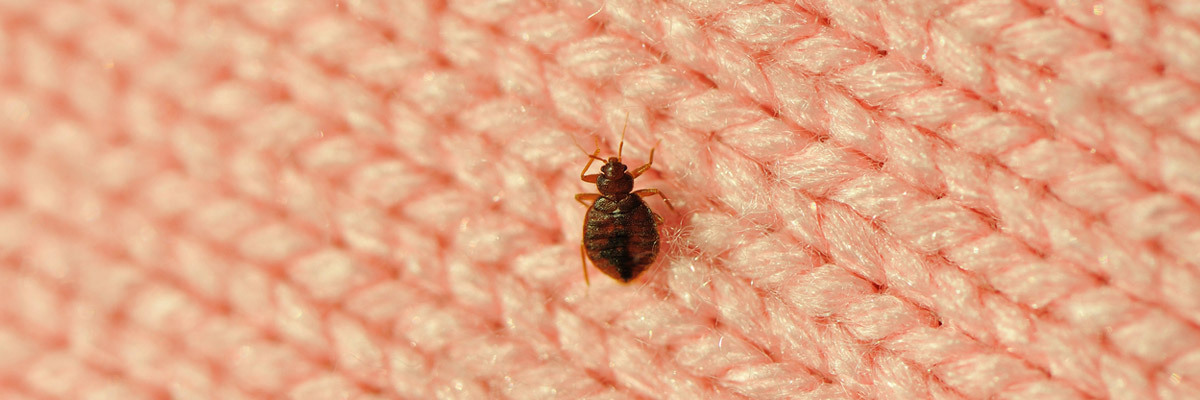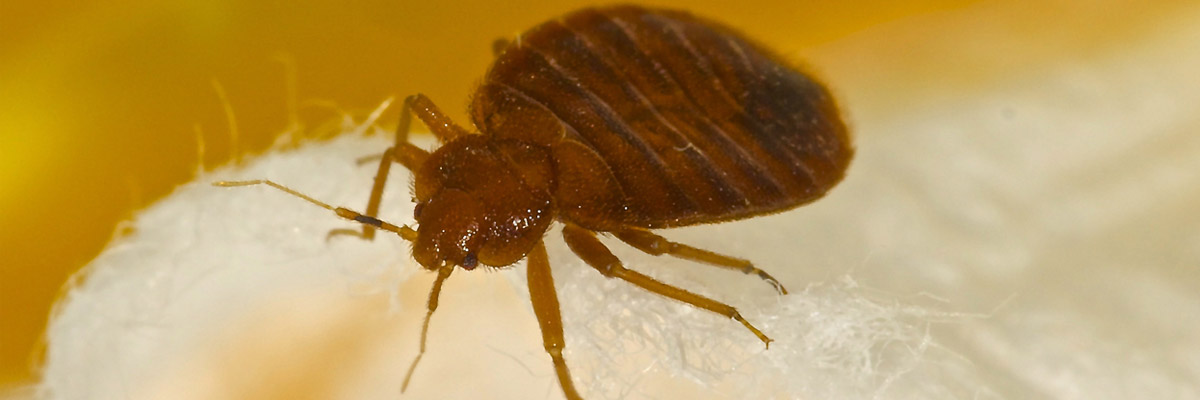The Full Guide to Bed Bug Control and Treatment
Do I Have Bed Bugs?
One of the most telltale signs of bed bugs is when you wake up covered in mysterious bites. The bites will be small and red – sometimes appearing in a line or tightly clustered together. Though the bites aren’t a cause for serious concern, they will be itchy. Use an over-the-counter hydrocortisone cream to prevent the itching and try not to pick at any of the bites. Picking at the bites will only make them worse and may increase your risk of infection.
Bites alone won’t confirm that you’re dealing with bed bugs. To be certain an infestation has occurred, you should inspect around your bed and look for physical signs of the bugs. They’re small, but they’re still visible. To inspect, remove the sheets from your bed, look at your mattress and around any cracks or crevices near your bed frame. If you see any movement, try to capture the bed bug on a piece of tape. A bed bug will be about the size of a small apple seed with a brownish-red coloring. They have an oval-shaped, flat body with three legs on each side.
Even if you don’t see the bugs themselves, they’ll leave other signs of their presence. A large infestation will show itself through fecal matter stains on your mattress, sheets, or carpet. These will be small red or brownish specks. As bed bugs grow, they also shed their skin (similar to snakes), so you may see those remnants lying around the floor or behind your furniture.
What Kills Bed Bugs?
Bed bugs survive solely on blood. In theory, you’d think that removing their food source would help to kill them, but bed bugs have evolved to store moisture and nutrients for long periods of time. Even if they don’t have people or animals to feed on, they’ve been known to survive up to a year just by using the energy from their last meal.
If you’re dealing with a bad bed bug infestation, it’s essential to change where you’re sleeping so you stop getting bit. However, this won’t help to kill the bed bugs. Instead, you’ll need either extreme heat, extreme cold, or chemical pesticides.
When it comes to pesticides, you can use chemicals specifically designed to target bed bugs that are early in their lifecycle (insect growth regulators). These will kill off young bed bugs and prevent the population from growing, but you’ll still need to kill the rest of the pests. You can also use chemicals that dehydrate the bed bugs - called desiccants - though these take a little while to fully kill off the infestation. Pyrethrins and pyrethroids are other options that are very common for all types of pest control. These work to affect the bugs’ nervous system and can kill off the population quicker than desiccants or growth regulators.
Harsh chemicals like bleach and alcohol can kill bed bugs instantly, but they aren’t a good idea for a long-term strategy. It’s dangerous to use these types of chemicals in large quantities, and it can be hard to ensure you’ve affected the entire colony. If not, the bed bugs will reproduce and force you to continue retreating.
Using hot and cold methods is one of the best ways to kill off a lot of bed bugs and sanitize without using harsh chemicals. For these methods, you can use a steamer to kill bugs on-the-spot or place any affected sheets and clothes into the dryer or freezer. The extreme temperatures will kill off the bed bugs so you can focus on treating the rest of the affected room for straggler bed bugs or eggs.

How to DIY Bed Bug Removal
If you aren’t dealing with a very large infestation, you may be able to get rid of bed bugs on your own. Even if you are dealing with a more significant infestation, there are many techniques you can use to supplement professional pest control efforts.
The most important thing you can do on your own is to prevent the infestation from spreading to more rooms in your home. Take all the bedding and clothing from the infested room and start by washing the clothes in hot water, then running the clothes in the dryer on the highest setting for at least 30 minutes. As you’re transferring anything from the room, make sure it’s tightly sealed in a plastic bag.
Next, use some of the methods we listed above to target bed bugs that may still be hiding throughout the room. A spray pesticide, powder, or steamer are some of the best ways to reach all the places where bed bugs hide. Be sure to treat your mattress and box spring, bed framing, and any cracks and crevices around the room. Though the bed bugs congregate on your bed, they can quickly disperse throughout the rest of the room.
You can purchase some types of bed bug killers online or in stores, though you’ll need to contact a pest control company for professional-grade foggers or other pesticides. When it comes to harsh chemicals, it’s best to work with trained technicians who know exactly how to use the products and the amount of time it takes for the area to be safe again.
If you’re looking for natural options, you can also find popular products to buy and use on your own. These are usually safer to apply without professional assistance. Diatomaceous earth and essential oils, like peppermint and tea tree oil, work to kill or ward off bed bugs without staining fabrics or filling your room with chemical fumes. Diatomaceous earth works as a desiccant and dehydrates the bed bugs by breaking down their outer exoskeleton. Essential oils can repel more bed bugs from making a home near your bed, so they’re great to use as a preventative measure.

Professional Bed Bug Pest Control
If your bed bug problem is getting out of hand quickly or affecting your day-to-day life, it’s time to call a professional pest control company. Bed bug experts at companies like Terminix are specially trained to find all the pests in your home and identify the best solution.
A trained technician will start with an inspection where they’ll determine if the infestation is confined to one room or if it’s grown throughout your house. After determining all the affected areas, they’ll perform an initial treatment where they sanitize all bedding and clothes in the infested rooms. For this, they’ll use extreme heat, extreme cold, or chemical treatments.
Next, they’ll return to the infested rooms to treat for hidden bed bugs around the floor and furniture, and they’ll make sure their methods are also treating for bed bug eggs. For this portion of treatment, you may be able to work with the technicians to discuss the methods or insecticides that they’ll use. Depending on the size of the infestation, they may be able to suggest a heat steamer or freeze treatment rather than a chemical fogger. Unfortunately, a severe infestation could require your home to be tented, leaving it uninhabitable for a few days.
How Much Does it Cost to Get Rid of Bed Bugs?
The costs of bed bug treatment will depend on the size of the infestation, how much damage has already been caused, and the size of your home. If you’re using DIY methods for bed bug control, you may only spend $100-$300, while professional pest control could be $1,000 up to $5,000.

Preventing a Bed Bug Infestation
Whether you’ve never had a bed bug infestation or have just successfully eliminated one, prevention is crucial. Keeping your home safe from invaders will keep you safe and happy while also helping to save money in the long run.
Whenever you travel, take a look at the mattress and bedding you’ll be sleeping on before you get cozy. If there’s any sign of bed bugs, you’ll probably see them or their fecal marking on the sheets. If you don’t have the option to change where you’ll be sleeping, bring a vinyl or plastic mattress protector with you when you travel. It’ll slip over the mattress and under the sheets so you’re protected from the possibility of bugs.
When you return home from traveling, always wash your clothes in a hot setting and clean them before coming into contact with your bed or any other fabric throughout the home. Proper hygiene during and after traveling controls bed bugs and can stop them from becoming a big problem inside your home.
Also, keep your pets in mind if you have cats or dogs that go in and out of the home. Your pets could be bringing bed bugs into your home if they don’t have proper pest medications. You can find preventative medicine for outdoor animals that will prevent fleas, ticks, bed bugs, and more.
One of the best ways to prevent a bed bug infestation is by investing in ongoing pest control services. Most companies offer annual inspections that can identify a bed bug infestation and stop it in its tracks before you’re dealing with ongoing damage.
